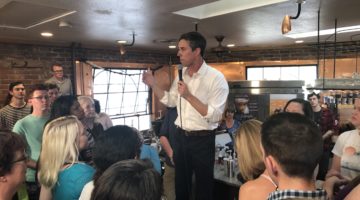
Rachel Spacek/Nevada Sagebrush
David Greene, left, RonNell Anderson Jones, center, and Patrick File, right, discuss the First Amendment and the freedom of the press on Tuesday, April 18, in the Joe Crowley Student Union. The panel discussed ways the audience could support the press in the current political climate.
From threats to remove the White House Press Corps to denials of press credentials to traditionally credentialed press, President Donald J. Trump has changed the norms and customs of how the President and his team interacts with the press. Media Law Professor at the Reynolds School of Journalism at the University of Nevada, Reno, Patrick File hosted a forum called “First Amendment Under Fire?” where File and two experts discussed how the First Amendment is in jeopardy and ways the public can help.
David Greene, a Senior Staff Attorney and Civil Liberties Director at the Electronic Frontier Foundation and RonNell Anderson Jones, a professor of law at the University of Utah SJ Quinney College of Law discussed threats to the freedom of the press and the First Amendment in the current political climate.
“So it may be, as they say, the best of times and the worst of times for the First Amendment,” File said in his introduction. “One thing is sure, however, the robust public discussion about the First Amendment and the freedoms of speech and press is urgently needed.”
Before beginning the Question and Answer portion of the forum, both Greene and Jones gave a short introduction of their work and their feelings towards the First Amendment in today’s political climate.
In her intro, Jones said she fears that many people think that the Constitution will protect the press against many of Trump’s anti-press policies. She argues instead that the Constitution provides few laws that protect the freedoms of the press.
“It is comforting to a lot of people to assume that the Constitution will serve as a stronghold against Trump’s assault on the liberty of the press,” Jones said. “But the real truth is that legal protections for the press are far feebler than what most people think and even more concerning, they have been weakening significantly in recent years.”
Jones said that in order to protect the press from Trump’s attacks, it is up to the public and individuals to demand a free press.
“Like so much of our democracy, the freedom of the press is only as strong as we, the public demand it to be,” Jones said.
Greene followed Jones’ introduction by discussing mass surveillance programs and how they pertain to the First Amendment and people’s freedoms.
Greene said that if the results of the election had gone in favor of the Democratic nominee for President, Hillary Clinton, and the Democrats, there may have been some hope for reforms of the mass surveillance programs. However, he is skeptical that the current administration would pass any such reforms.
During the Question and Answer portion of the panel discussion, Greene and Jones both stressed the importance of supporting local and national news outlets and making sure individuals are watching and reading a wide variety of news sources, even sources that may go against any personal bias.
Both presenters also discussed the importance of promoting media literacy in daily life and in educational institutions. They also reminded the audience to stay skeptical of everything they hear and read.
While both Greene and Jones cited numerous threats to the First Amendment, particularly in today’s political climate, they gave a number of ways to fight back against these threats, including supporting and donating to local news outlets, calling local representatives and always remaining skeptical.












